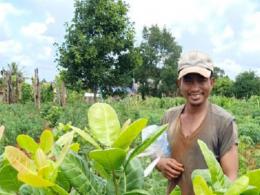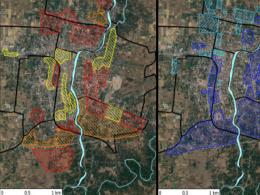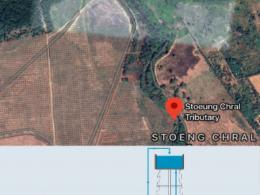Appropriate costing methods of climate change adaptation in infrastructure development: experimental studies for road and related infrastructure projects in Cambodia (CAMI)
Background
The climate change impacts coupling with poor design and construction, and lack of climate resilient planning consideration like adaptation costing have severely damaged every year the road networks (61,000 km) in Cambodia, and sections of roads are cut off during the heavy rainfalls. 2019 flood caused road damage to about 500 km long, directly affected 488,611 households, and damaged agricultural crops of some 36,724 ha. And 2011 total flood damages accounted for 630 million USD. The national budget used for repair and maintenance of roads and related infrastructures has reportedly increased every year from 36 mil USD in 2010 to 90 mil USD in 2017.
There is a lack of nationally accepted standard of adaptation costing methods in Cambodia that can be applied by both public and private sectors to plan for the resilient infrastructures in the vulnerable provinces. Therefore, this research project is to explore and assess the appropriate costing methods for climate adaptation of roads and related infrastructure projects so that damages and losses caused by flood and other climate hazards can be properly incorporated into the design and construction from the economic and climate change standpoints.
Overall Objective
Enhance the climate resilience capacity of roads and related
development sectors in Cambodia
Specific Objectives
1. To analyse the damages and losses due to climate change on roads and related infrastructures (national and rural roads, bridges, culverts, small scale irrigation system, and related infrastructures);
2. To conduct the cost and benefit analysis on roads and related infrastructures (for two scenarios without and with climate change adaptation measures, including climate projections; and
3. To develop the practical tools and methods for MPWT and MRD officers for analyzing adaptation related financial costs in roads, small scale irrigation, and related infrastructures.
Approach
Master of Science in Climate Change Program under the Royal University of Phnom Penh has formed a consortium with Asian Institute of Technology, and University of Freiburg in Germany to implement the project. The project will work closely with Ministry of Public Work and Transport, Ministry of Rural Development, and Ministry of Environment. We proposed to analyse the damages and losses (also historical data from government and donors funded projects), an d various methods of costing of climate change adaptation measures for roads and related infrastructure projects with MRD, MPWT, sub-national authorities, and local communities in proposed research sites of Kampong Thom, Pursat, Kratie, Prey Veng and Kampot provinces, including cost and benefit analysis of climate change for their road and infrastructure design, maintenance, and performance. This will explore how much cost for two scenarios, without and with climate change costs incurred for their implementation.
Outputs and Key Activities
| Result | Key Activities |
|---|---|
|
|
Knowledge Products
• tools and methods for damage and loss assessment • tools and methods on adaptation costing analysis and experimental studies • guidelines on adaptation costing of transport and small-scale irrigation infrastructures (national and provincial roads, and rural roads and small scale irrigation infrastructures) • course materials to be included into MCC curriculum like Economics of Climate Change, and several training materials on damage and loss assessment, and adaptation costing analysis for capacity buildings for relevant stakeholders
| Timeframe | Total Budget | Partners | Location |
|---|---|---|---|
| May 2021 to Dec 2023 | USD 206,415 (Total) CCCA (149,990) | Asian Institute of Technology; University of Freiburg; Ministry of Public Work and Transport ; Ministry of Rural Development; Ministry of Environment | Kampong Thom and Pursat (Tonle Sap Lake), Kratie and Prey Veng (Mekong River), and Kampot (coastal zone) |






